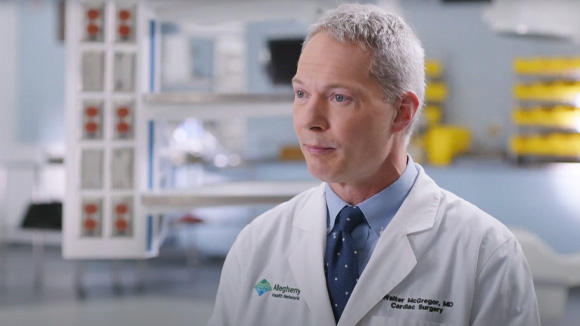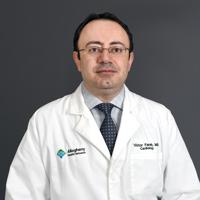Learn more about our appointment options, second opinions, locations, referrals, and resources.
AHN Mitral Valve Program
AHN Mitral Valve Program overview
Heart valve disease happens when one of your heart's valves doesn’t work correctly. One of the more common heart valve problems occurs in the mitral valve. This valve has two leaflets that allow blood to flow from the lungs into the left ventricle and prevents the blood from leaking backward. When the mitral valve doesn't fully close, the heart doesn't work properly.
Our team of cardiologists, surgeons, nurses, and other specialists work together to create a specialized care plan that works for you. The AHN Mitral Valve Program is among the best in the country and Allegheny General Hospital is the first hospital in Pennsylvania to receive the Mitral Valve Repair Reference Center Award from the American Heart Association® and the Mitral Foundation.* Our mitral valve program also holds the highest rating from the Society of Thoracic Surgeons for mitral valve repair and replacement.**
Symptoms of heart valve problems
Common risk factors for heart valve problems include your genetics, diabetes, a family history of heart disease or endocarditis (inflammation of the heart’s inner lining and heart valves). Some people develop symptoms over time, while others may not experience symptoms until the condition becomes severe. Some physical signs of heart valve disease include:
- Shortness of breath.
- Swollen body parts, such as the ankles, feet, or abdomen.
- Feeling lightheaded or faint.
- Palpitations (a fluttering heartbeat) or chest pain.
What is a heart valve?
The heart has four chambers with a valve between each chamber. Valves are thin but sturdy flaps of tissue that work together to keep blood flowing from one chamber to another. The four valves include the mitral valve, aortic valve, tricuspid valve, and pulmonary valve. Operating as a one-way route, each valve opens and closes as the heart beats to ensure that blood moves in the correct direction.
Mitral valve disease
The mitral valve’s two leaflets are located on the left side of the heart connecting the upper and lower chambers. They function like a double door, opening and closing to allow blood to flow into the left ventricle from the left atrium. When the mitral valve doesn’t close completely, it can lead to symptoms of a diseased mitral valve or even heart failure.
Whether you’ve been diagnosed with mitral valve disease, are experiencing symptoms, or have a family history of the condition, the mitral valve clinic at the AHN Cardiovascular Institute can help. Our multidisciplinary team of providers is nationally renowned for repairing or replacing damaged heart valves.
We offer dedicated care at the AHN Heart Valve Clinic for all types of heart valve problems. If you have mitral valve disease, valve surgery and other treatments can improve heart function and significantly reduce your risk of heart failure. Our minimally invasive procedures help patients recover faster.
AHN’s unique program offers a range of treatment options for those experiencing heart problems or conditions. The following divisions may be involved, depending on a patient’s condition and their individualized care plan:
- Cardiac Surgery
- Interventional Cardiology
- Cardiovascular Imaging
- General Cardiology
- Heart Failure and Transplant
The Mitral Valve Repair Reference Center Award Program was created by the Mitral Foundation and the American Heart Association® to identify and recognize the nation's best hospitals and surgeons for mitral valve repair surgery based on objective performance measures.
The Society for Thoracic Surgeons star rating system measures quality in health care, rating the benchmarked outcomes of cardiothoracic surgery programs in the United States and Canada. In June 2022, AHN received three out of three stars for its Mitral Valve Repair and Replacement Program.
American Heart Association® is a trademark of American Heart Association, Inc., and used with permission.
How we treat mitral valve conditions
Our team of experts in mitral valve repair stay up to date on current innovations for diagnosing, treating, and preventing various heart conditions.
Mitral valve conditions we treat
The most common conditions treated at the AHN Mitral Valve Program include:
- Heart valve disease. This is a serious condition that happens when at least one of the heart’s valves doesn’t function properly.
- Mitral valve disease:
- Mitral valve regurgitation. Also referred to as mitral insufficiency or a leaky heart valve, this type of heart valve disease happens when blood flows back into the atrium when the left ventricle contracts. This condition is caused by an improperly closing heart valve and may lead to arrhythmia, heart failure, or pulmonary hypertension.
- Mitral valve stenosis. This disease causes the heart valve to narrow, resulting in restricted blood flow into the left ventricle from the left atrium. This makes your heart work harder, potentially increasing your risk of heart failure, pulmonary hypertension, and arrhythmia.
See a complete list of heart disease conditions we treat at the AHN Cardiovascular Institute.

“We were recently recognized by the Mitral Foundation and the American Heart Association as a mitral valve repair reference center... meaning we have a high volume of patients and a lot of experience with mitral valve disease and typically end up with a greater than 95% likelihood of valve repair.”
Dr. Walter McGregor — Thoracic and Cardiac Surgery
Mitral valve treatment
The AHN Cardiovascular Institute offers treatment options for even the most complex of valve diseases. We will work with you to develop the best care plan for your specific needs. We offer the following treatments:
- Surgical valve repair or replacement surgery: This surgical procedure either repairs your existing valve or replaces it with a mechanical or artificial tissue valve. Learn more about surgical valve repair or replacement surgery.
- Robotic mitral valve repair or replacement: A surgeon uses a state-of-the-art robotic system to perform complex procedures, such as repairing or replacing a mitral valve, with visibility from high-resolution 3D cameras inserted through tiny skin incisions. Learn more about robotic mitral valve repair or replacement.
- Transcatheter Edge-to-Edge Repair: This procedure uses high-fidelity imaging to lead surgeons as they thread a catheter from a blood vessel in your groin up to your heart to treat mitral valve regurgitation. A clip is then secured in place to help decrease valve leakage and improve the valve’s closure.
- Transcatheter mitral valve replacement: This process places an artificial tissue valve inside your existing, diseased mitral valve to treat mitral stenosis and mitral valve regurgitation. This form of treatment also uses high-fidelity imaging and catheters to successfully treat the condition.
- Percutaneous balloon mitral valvuloplasty: This procedure is used in patients with rheumatic mitral valve stenosis when surgery is not an option. A thin balloon catheter is threaded through a vein in your groin up to your heart. The balloon tip is then positioned inside the narrowed valve and expanded several times to stretch open the valve’s leaflets to increase blood flow.
- Minimally invasive heart surgery: This approach accesses the heart by creating smaller incisions than the traditional open-heart procedure. This state-of-the-art method often results in shorter hospital stays, less pain, minimal scarring, and quicker return to daily activities. Learn more about minimally invasive heart surgery.
By accessing this video, I understand that I am leaving the AHN website and I will be re-directed to an external website operated by a third party platform provider. I acknowledge that the platform provider may collect personal information about me, and about the video that I view, on their platform and may use and disclose this information in accordance with its privacy policy. I agree that Allegheny Health Network is not responsible for the data collection and use practices of this third party.
Why choose us?
Our experts are ready to help you improve your heart function. Our heart specialists are dedicated to treating many conditions and symptoms and work together to develop an individualized care plan tailored to each patient’s specific needs.
Efficiency
We provide our patients with the most advanced imaging, fast testing, and results so they can have the imaging they need in time for appointments.
Coordination
The AHN Mitral Valve Program allows patients to meet with several specialists to help determine the best treatment for their conditions. Our experts collaborate to review the progress and develop an individualized care plan for each patient.
Customized treatment plans
We create personalized mitral valve prolapse management and related treatment plans. Our team of experts offers information on lifestyle changes, new therapies, and medications that work best for each patient’s specific needs.
Expertise
Our nationally recognized surgeons and mitral valve repair doctors are by your side when you receive treatment at our mitral valve clinic. They know how to manage mitral valve prolapse and other cardiac-related conditions. We use the most advanced technologies and minimally invasive procedures to provide patients with surgical options that are more gentle than traditional surgery and generally require shorter hospital stays.
Meet the AHN mitral valve clinic specialists
At AHN's mitral valve clinic, you’ll work with specialists dedicated to treating mitral valve disease, including:

System Chair, Cardiovascular Institute, Allegheny Health Network
Surgical Director, Structural Heart Program, Allegheny General Hospital

Director, Cardiac Surgery

Thoracic and Cardiac Surgery

David M Lasorda, DO, FACC, FACP, FSCAI
Interventional Cardiology

Interventional Cardiology

Cardiology

Rachel A Hughes-Doichev, MD, FASE, FACC
Cardiology

Cardiology

Advanced Heart Failure and Transplant

Cardiovascular Disease
How to get mitral valve care
If you’ve been diagnosed with mitral valve disease, we’re here to help get you the individualized care you need.
AHN Mitral Valve Program appointments and information
Not yet diagnosed
If you don’t have a diagnosis, call (412) DOCTORS (412) 362-8677 to make an appointment with your primary care provider. They will explore all possible causes of your symptoms.
Second opinions
Call the AHN Mitral Valve Program for more information or to schedule an appointment at (855) 4MITRAL (855) 464-8725.
Scheduling treatment
If you have a referral and are ready to schedule your procedure, please call the facility where you would like to have the procedure done:
Pittsburgh:
Allegheny General Hospital
320 East North Avenue
South Tower, First Floor
Pittsburgh, PA 15212
GET DIRECTIONS
Forbes Hospital
2570 Haymaker Road
Monroeville, PA 15146
GET DIRECTIONS
South Hills:
Jefferson Hospital
565 Coal Valley Road
Jefferson Hills, PA 15025
GET DIRECTIONS
Mitral valve research
AHN Cardiovascular Research Institute
AHN’s Cardiovascular Research Institute is established on more than 100 years of innovation, spanning diverse areas of focus, including research for the latest in heart disease treatments. Our qualified team and mitral valve repair doctors take pride in utilizing new devices and medications, as well as state-of-the-art technology and therapies, to help revolutionize care for heart disease patients.
What is a clinical trial?
Clinical trials are unique research opportunities that explore medical treatments, strategies, or devices to ensure they’re safe and effective for humans.
Active clinical trials
By prioritizing research and innovation, our physicians and patients are engaged in more than 100 national and international clinical trials. Participating in these trials gives AHN patients access to some of the newest potential treatment options. Participation in clinical trials is voluntary and based on meeting eligibility criteria.
To express interest in a clinical trial or learn more about research opportunities, check out our active clinical trials.
AHN Mitral Valve Program referral information for health care professionals
Refer your patient to an AHN cardiovascular specialist
Non-AHN providers can submit an online patient referral or by calling (844) MD-REFER (844) 637-3337.
Non-AHN providers can use the EpicCare® Link™ platform to view updates on their patients’ care within AHN after the initial referral is completed.
Medical records
If you need access to specific test results or imaging not provided in the EpicCare® Link™ platform, please fill out a medical record request form.
EpicCare® is a registered trademark of Epic Systems Corporation and used with permission.
EpicCare® Link™ is a trademark of Epic Systems Corporation and used with permission.

